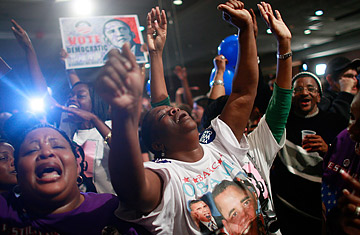
Obama supporters Mary Decker, center, Annete Davis, left, and others celebrate as the Democrat's presidential win is announced in Birmingham, Ala., on Nov. 4
Much of black America is still struggling to grasp the full meaning of Barack Obama's election to the presidency. The overall mood is awash with pride but shaded with angst and the larger question: Now what?
On Wednesday, the Harvard University scholar Henry Louis Gates Jr. appeared on Oprah Winfrey's celebratory post-election special. After learning the news, Gates says, "we jumped up, we wept, we hooped and hollered." It is hard to overestimate the historical significance of the election of the first black U.S. President. For many blacks, and certainly for much of the country and world, Obama's victory is an extraordinary step toward the redemption of America's original 400-year-old sin. It is astonishing not least for its quickness, coming just 145 years after President Abraham Lincoln issued the Emancipation Proclamation effectively ending slavery and four decades after the assassination of Martin Luther King Jr. And it is even more astonishing for its decisiveness — Obama carried Virginia, once the home of the Confederacy, a place whose laws just five decades ago would have made the interracial union of his parents illegal. (See pictures of Barack Obama's family tree.)
"Just a little more than 10 years ago," Atlanta mayor Shirley Franklin told TIME this week, "it was inconceivable to any of us that we would see an African American win a national party's ticket and then compete effectively. It's mind-boggling," she continued, "how much this means about the opportunities available to all people — Asians, Latinos and other people who've historically been locked out of the system." (See pictures of Election 2008 in the heart of the Civil Rights struggle.)
What is perhaps most surprising about many blacks' support of Obama is that it was not immediate or easy. Many African Americans were initially skeptical about Obama's candidacy, partly because they regarded him as somehow inauthentically black due to his upbringing in Hawaii and Indonesia, as well as his last name, which even the President-elect has described as "funny sounding."
Black support of Obama soared after he won last winter's Iowa caucuses. But there were moments in this campaign when Obama was forced to manage the issue of race deftly and explain the unexplainable to a largely white electorate. Consider the case of his former pastor, the Rev. Jeremiah Wright Jr. Obama joined Wright's Trinity United Church of Christ in Chicago in the 1980s, when Obama was an obscure community organizer. Trinity gave Obama an entrée to the city's thriving black middle class, and Obama came to view Wright in particular as a mentor. Yet earlier this year, Obama was compelled for political reasons to leave the church. The public criticism stemmed from controversial comments about the U.S. by Wright that proved too harsh to the ears of outsiders, many who are not aware of the nuances of the black religious-cultural experience, or of the fact that black churches have traditionally been a place for coping with the legacy of racism in this country. When Obama left Trinity, he suggested that the scrutiny he faced because of Wright's sermons would follow him to whatever church he and his family chose to attend as the First Family. That will be especially true if the Obamas choose another traditional black church, where the rhetoric on matters of social policy and everyday life — not just on racism — may sound radical to much of the country.
